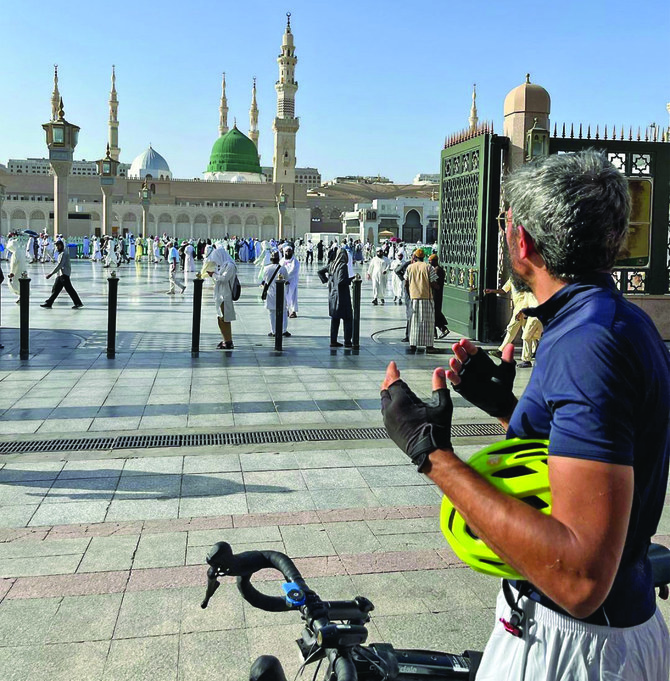JEDDAH: Nabil Ennasri, a French Hajj pilgrim of Moroccan origin, recently arrived in Saudi Arabia after covering a distance of over 5,000 km by bicycle.
He began his journey in Paris on April 22, and has crossed 11 countries including Italy, Slovenia, Croatia, Montenegro, Bosnia and Herzegovina, Albania, Greece, Jordan and Turkiye.
Ennasri is a French affairs analyst, writer and civil society activist focusing on a variety of social issues, including discrimination and education.

Nabil Ennasri pedals to raise climate change awareness. (Supplied)
While sharing updates from his journey on social media, the 41-year-old said that he wanted to revive the traditional pilgrimage experience that Muslims followed in the past and also to draw attention to global warming.
Ennasri shared an emotional video of his arrival at the Prophet’s Mosque in Madinah, in which he said: “It is difficult to express these feelings because your prayer is not the same as when you have been on a 57-day trip to come and pray at the Prophet’s Mosque, and when you take a seven-hour flight.”
During his short stay in Jeddah, en route to Makkah, the French cyclist was warmly welcomed by the Saudi Cycling Federation and held a practice session with the members of the club on the Jeddah Corniche.

Leaving for Makkah on Saturday, Ennasri was able to retrace the slow journey taken by Muslims, and some of his own relatives, in the past.
“Some members of my family also traveled on foot. It could have taken months or even years. Some lost their lives during the journey,” he said.
“When I remember these moments, I find the strength in me.”
Explaining the significance of his journey, he added: “My first objective is to explain global warming; it is very important for our children and future generations.
“My second goal is to understand what kind of difficulties people (experienced) on pilgrimage in ancient times, to understand their long journeys on foot.”
Our planet is our home and we have to preserve it for future generations.
Nabil Ennasri, French pilgrim
In another video shot in Madinah, Ennasri said: “I received a message from my friend Thomas who is not a Muslim. He says that even if he does not share my faith, he is enthusiastic about my project, about the fact that we try to raise awareness around ecology and environment.
“I liked his message and replied back saying that it is beyond our philosophical or religious differences because our faith in human beings reunite us. Our planet is our home and we have to preserve it for future generations.”
According to Ennasri, global warming is a major problem facing humanity today.
“It is important for me to protect nature and our world, and to explain this to the Muslim community. I think there is a misunderstanding about global warming; people don’t understand what it is about.”
Ennasri hopes that his trip will inspire other Muslims and community members to rethink their own approaches to travel.





















